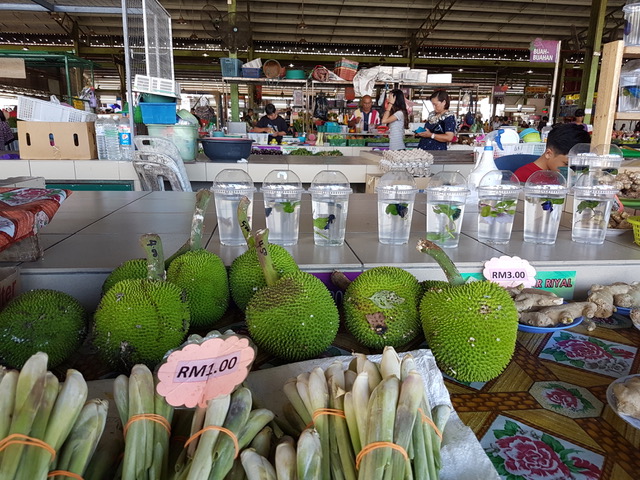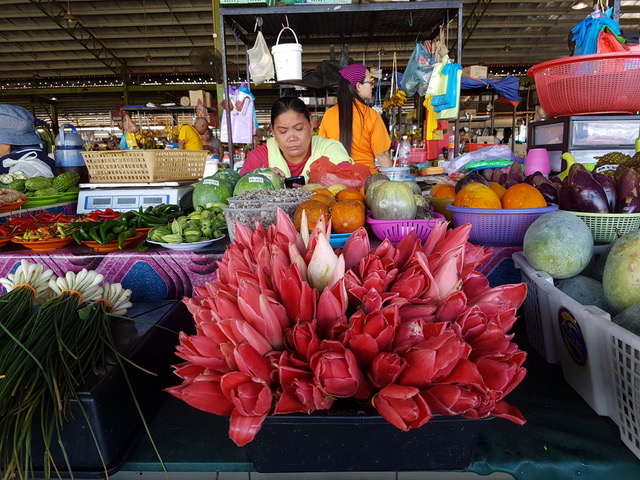
Kenyalang Portraits
By Lian Cheng and Wilfred Pilo
LOCATED about 20km away from the Kuching city centre, situated along Jalan Datuk Mohammad Musa, is Bandar Riyal Market, commonly known as Samarindah Market, a hidden gem of Kota Samarahan.
The market may appear to be like any other market at the first glance, but a closer look will tell a different story.
It is a colourful market, not only due to the variety of hues exuded by the local produce for sale but because of the many wonderful personalities that operate their business there.


Fruit vendor Rita Lalog, 51 has been operating here since the market opened in 2015 and she manages to make about RM2,000 to supplement the income of her Chinese husband.
“Since I have my own business here, my life has changed and I would encourage other women to do the same,” Rita told DayakDaily recently.
Meanwhile, Rita also asserts it has a good influence on her son, Henry Daniel Siong, 10, who has been helping Rita when he is not in school.

“I help my mother when I am free. I like what they are doing because I can learn how business is done,” said Henry, who hopes that that his parents will earn more so he can upgrade his Android phone.
Barbecue chicken vendor Mohd Halik, 22, from Kampung Pengakalan Kuap has been in this business since young through helping his father. Business at the market is good where they sell about 40 birds per day on average and a similar quantity of barbecued mackerel. His brother-in-law Faizul Julai shares his optimism on the work that they do, despite the long hours they put in.
“There are many barbecue operators including those from the Dayak commumity. This place offers a good and healthy business environment. We all learn from each other and most important of all, we take good care of our loyal patrons.”
Like Mohd Halik, Faizul’s life philosophy is simple — work hard, help themselves and be independent and successful.
“We do hope to have a proper stall and maybe the council can see to it that we have a conducive place for operating business here,” said Faizul.

University Technologi Mara (UiTM) student Brandonly, 19, has been helping his parents to man a pork barbecue stall at the market during weekends.
“Business here is good. We have students from universities within the vicinity patronising our stall. This is the only wet market within the Desa Ilmu area,” said Brandonly.

The market is well known for its cheap but fresh local ginger. While in other markets, it may be sold at RM17 per kg or more, here, it is sold for RM14 per kg. Customers can also get a good deal, if they were to choose less fresh ginger which sell at RM5 per basket.
Ginger vendor Lee, an Iban from Limbang with a Chinese name said the business will not rake in a lot when he has to pay RM11 per kg to the supplier and sell it at RM14 per kg.
“Yes, we can make a bit of profit at the stall but the profit margin is small. I hope to be able to do something else. This business to me is only temporary. I still hope to be involved in other businesses,” said Lee, who is a licensed contractor, mechanic and crane operator.


Another unique scene at this market is the Chinese stall that sells local Dayak “parang” (machete). Though parang-making is a Dayak tradition, here it is a Chinese — Loh Tet Sine of Yak Lee Ironworks — who vows to hold on to and pass on the traditional way of making parang.
He said the raw material used for the parang he sells is recycled metal from the springs of heavy vehicles such as lorries and trucks.
“Iban parang-making is a skill which will soon vanish if we don’t keep it. I don’t want that to happen. I took over the business from my father. In our factory in Bintawa, all our parang-making masters are natives. We stick to the traditional Iban parang-making tradition.
“Although imported ones are of the same pattern as ours, to us, ours are distinctive because there is a personal touch, unlike the imported ones that are produced in large quantities by using machines,” said Loh, stating that his business’ main competition are imported machetes which may be sold at cheaper prices.


There are about 60 stalls at the market and apart from the usual products of fish, pork and imported vegetables and fruits, there are many types of jungle and agricultural produce that can be found here.
The market was opened in 2015 to serve communities within the vicinity including Kota Samarahan town centre and Desa Ilmu.
Another characteristic of the market is that the foodstuff sold here is much cheaper, compared to other wet markets in Kuching. For example, the fishes sold here is at least RM2 to RM3 cheaper than at other markets. The same applies to the pork.
“And the fish and the pork are fresh, not that when they are sold cheaper, they are not fresh,” said a customer met at the market.



While most wet markets are vibrant since early in the morning, this market is the opposite. Some stalls here especially the fish stalls will only start operating from afternoon onwards. It is thus not surprising to see the crowds in the afternoon.
With an adjoining hawker centre, Samarindah Market offers customers pretty much everything, including a wonderful experience if one cares to find delight in the little daily details of life. — DayakDaily








